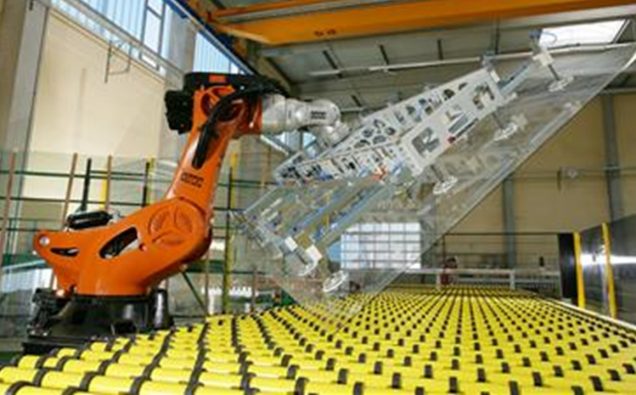
Image: Factory Automation with industrial robots for material handling in flat glass industry, company Grenzebach in Germany, robotics for high payloads Credit: KUKA Roboter GmbH, Bachmann/Wikimedia
If you get goose bumps from the feeling that you are getting advertisements in your mail inbox based on what your cell phone is listening, you are not alone.
But then, you are also not alone in enjoying the benefits of improved cars, better health facilities and digital economic opportunity.
Such is the double-edged prospect of artificial intelligence – the replication of human intelligence by machines -that it brings both the promise of rapid growth and the peril of losing privacy simultaneously.
Away from the individual dilemma of “a machine-driven life or unparalleled ease of growing economically,” the AI is almost imperceptibly becoming indispensable to so many areas of collective life.
The AI promise seems to be growing particularly fast in key areas ranging from agriculture to industrial output to the use of various applications in transport and medical sciences.
“Is it (AI) good news or bad news?” Francis Gurry, the World Intellectual Property Organization, WIPO, wondered like many of us as his organization shared the latest edition of the Technology Trends report last month.
“Well, I would tend to say that all technology is somewhat neutral, and it depends on what you do with it. So, insofar as you may use AI science and techniques for developing autonomous weapons systems that are going to kill us all, is not very good news, but insofar as it’s being used to improve health indicators for diagnostics, for other purposes, it’s great news.”
The WIPO Technology Trends report reveals that 50 percent of all patents for AI have been published during the last five years, since 2013, adding up to more than 170,000 different patented ideas.
Gurry calls it a “quantum leap.” But will it be a quantum leap for all, especially for the developing countries with little attention to research, innovation or higher education due to a variety of factors including corruption, ineffective leadership or simply a paucity of resources.
The report points to the escalating contrasts that the world as a whole might be faced with in the years ahead.
The United States and China, the two largest economies, dominate the field of patent application with tech giant IBM leading by number of patent applications (8,290), followed by Microsoft (5,930). Japan’s Toshiba has the next highest patent tally (5,223), ahead of South Korea’s Samsung (5,102) and Japan’s NEC Group (4,406), the report says.
Artificial intelligence patent filings: Transportation sector growing fastest https://t.co/jBWsJkKWWz. #SelfDrivingCars #selfdriving #automotive #AutonomousVehicles #WIPOtechtrends pic.twitter.com/ydkPFWi9Du
— WIPO (@WIPO) January 31, 2019
The food for thought served by the report sounds like this:
Will this boom in the AI patents widen the growth gap even more between the prosperous and developing countries?
Well, the thought seems to be bordering more on the yes on many counts.
The introduction of the latest technology in hospitals may help people but for the human development the scenario does not give much hope unless countries and regions – mired in conflicts, woeful lack of governance and political instability – improve their governance and the quality of education to catch up with latest currents in the knowledge economy.
One ray of hope is the growing use of the Internet and cell phones in the developing countries. The World Bank has recorded stories of how farmers in the developing countries have embraced the technology to boost their sales. Similarly, small businesses can use the Internet to market and expand their sales.
But how to make the AI technology work for the developing world in a way that does not drain its limited financial resources, and actually helps spur industrial growth? There is also a palpable concern among policymakers and vulnerable communities that introduction of AI in traditionally labor-intensive fields might put people out of work with immediate socioeconomic implications. In its The Future of Jobs 2018 report, the World Economic Forum raised some of the key questions facing the world on the very real prospect of AI replacing humans and upsetting the job market.
That brings into focus the role of world bodies – diplomatic forums like the United Nations and finance institutions like the World Bank and the IMF. The developed world, both through multilateral forums and bilaterally, will have to assist the developing countries in South Asia, Africa and the Middle East to enjoy the benefits of the promising AI boom.















